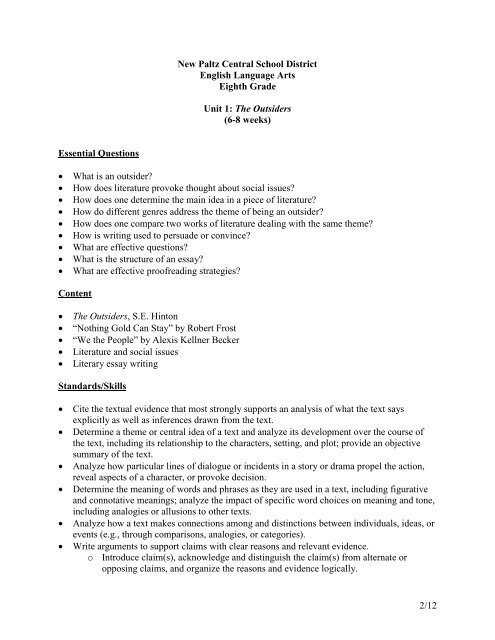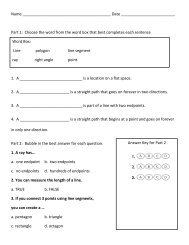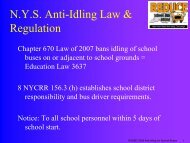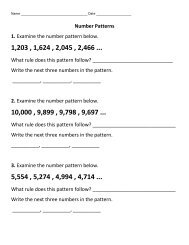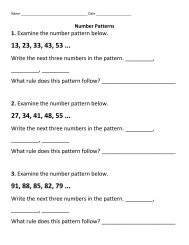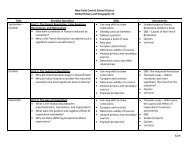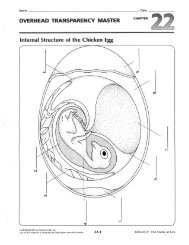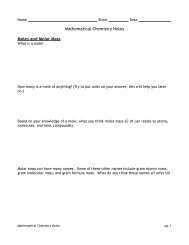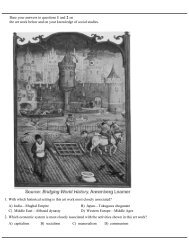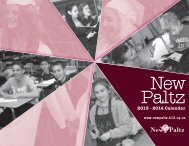6-8 weeks - New Paltz High School
6-8 weeks - New Paltz High School
6-8 weeks - New Paltz High School
- No tags were found...
You also want an ePaper? Increase the reach of your titles
YUMPU automatically turns print PDFs into web optimized ePapers that Google loves.
<strong>New</strong> <strong>Paltz</strong> Central <strong>School</strong> District<br />
English Language Arts<br />
Eighth Grade<br />
Unit 1: The Outsiders<br />
(6-8 <strong>weeks</strong>)<br />
Essential Questions<br />
<br />
<br />
<br />
<br />
<br />
<br />
<br />
<br />
<br />
What is an outsider?<br />
How does literature provoke thought about social issues?<br />
How does one determine the main idea in a piece of literature?<br />
How do different genres address the theme of being an outsider?<br />
How does one compare two works of literature dealing with the same theme?<br />
How is writing used to persuade or convince?<br />
What are effective questions?<br />
What is the structure of an essay?<br />
What are effective proofreading strategies?<br />
Content<br />
<br />
<br />
<br />
<br />
<br />
The Outsiders, S.E. Hinton<br />
“Nothing Gold Can Stay” by Robert Frost<br />
“We the People” by Alexis Kellner Becker<br />
Literature and social issues<br />
Literary essay writing<br />
Standards/Skills<br />
<br />
<br />
<br />
<br />
<br />
<br />
Cite the textual evidence that most strongly supports an analysis of what the text says<br />
explicitly as well as inferences drawn from the text.<br />
Determine a theme or central idea of a text and analyze its development over the course of<br />
the text, including its relationship to the characters, setting, and plot; provide an objective<br />
summary of the text.<br />
Analyze how particular lines of dialogue or incidents in a story or drama propel the action,<br />
reveal aspects of a character, or provoke decision.<br />
Determine the meaning of words and phrases as they are used in a text, including figurative<br />
and connotative meanings; analyze the impact of specific word choices on meaning and tone,<br />
including analogies or allusions to other texts.<br />
Analyze how a text makes connections among and distinctions between individuals, ideas, or<br />
events (e.g., through comparisons, analogies, or categories).<br />
Write arguments to support claims with clear reasons and relevant evidence.<br />
o Introduce claim(s), acknowledge and distinguish the claim(s) from alternate or<br />
opposing claims, and organize the reasons and evidence logically.<br />
2/12
o Support claim(s) with logical reasoning and relevant evidence, using accurate,<br />
credible sources and demonstrating an understanding of the topic or text.<br />
o Use words, phrases and clauses to create cohesion and clarify the relationships among<br />
claim(s), counterclaims, reasons, and evidence.<br />
o Establish and maintain a formal style.<br />
o Provide a concluding statement or section that follows from and supports the<br />
argument presented.<br />
Write informative/explanatory texts to examine a topic and convey ideas, concepts, and<br />
information through the selection, organization, and analysis of relevant content.<br />
o Introduce a topic clearly, previewing what is to follow; organize ideas, concepts, and<br />
information into broader categories; including formatting (e.g., headings), graphics<br />
(e.g., charts, tables), and multimedia when useful to aiding comprehension.<br />
o Develop the topic with relevant, well-chosen facts, definitions, concrete details,<br />
quotations, or other information and examples.<br />
o Use appropriate and varied transitions to create cohesion and clarify the relationships<br />
among ideas and concepts.<br />
o Use precise language and domain-specific vocabulary to inform about or explain the<br />
topic.<br />
o Establish and maintain a formal style.<br />
o Provide a concluding statement or section that follows from and supports the<br />
information or explanation presented.<br />
Produce clear and coherent writing in which the development, organization, and style are<br />
appropriate to task, purpose, and audience.<br />
o Produce text (print and nonprint) that explores a variety of cultures and perspectives.<br />
With some guidance and support from peers and adults, develop and strengthen writing as<br />
needed by planning, revising, editing, rewriting, or trying a new approach, focusing on how<br />
well purpose and audience have been addressed.<br />
Draw evidence from literary or informational texts to support analysis, reflection, and<br />
research.<br />
Write routinely over extended time frames (time for research, reflection, and revision) and<br />
shorter time frames (a single sitting or a day or two) for a range of discipline-specific tasks,<br />
purposes, and audiences.<br />
Engage effectively in a range of collaborative discussions (one-on-one, in groups, and<br />
teacher-led) with diverse partners on grade 8 topics, texts, and issues, building on others’<br />
ideas and expressing their own clearly.<br />
o Come to discussions prepared, having read or researched material under study;<br />
explicitly draw on that preparation by referring to evidence on the topic, text, or issue<br />
to probe and reflect on ideas under discussion.<br />
o Acknowledge new information expressed by others, and, when warranted, qualify or<br />
justify their own views in light of the evidence presented.<br />
Acquire and use accurately grade-appropriate general academic and domain-specific words<br />
and phrases; gather vocabulary knowledge when considering a word or phrase important to<br />
comprehension or expression.<br />
2/12
Assessments<br />
<br />
<br />
<br />
<br />
<br />
<br />
<br />
Skills checks - vocabulary and chapter checks using Senteo<br />
Writing activities - quote analysis, poetry analysis and synthesis<br />
Class discussion/Debate (S.O.S. - The Whole Mess is Cherry’s Fault)<br />
Quizzes<br />
GRASPS - website book review and teen gang article<br />
Unit assessment<br />
Mid-Year assessment - literary terms, vocabulary, reading recall, and comparative essay<br />
Key Vocabulary/Teacher Language<br />
Vocabulary for Instruction and Performance<br />
opinion vs. persuasive<br />
argument<br />
debate<br />
point of view<br />
plot<br />
conflict<br />
exposition<br />
inciting incident<br />
rising action<br />
climax<br />
falling action<br />
resolution<br />
denouement<br />
literary and personal response<br />
hook<br />
T.A.G.<br />
thesis<br />
concrete detail<br />
commentary<br />
summarize<br />
exemplar(y)<br />
evaluation of content<br />
allusion<br />
scaffolding<br />
planning<br />
editing<br />
role<br />
audience<br />
tone<br />
formal<br />
conversational<br />
Vocabulary for Novel/Poems<br />
abrupt<br />
acquire<br />
admirable<br />
aghast<br />
apparent<br />
array<br />
barren<br />
bleak<br />
circumstance<br />
contemptuous<br />
conviction<br />
delirious<br />
expectant<br />
gallant<br />
gingerly<br />
glint<br />
grimace<br />
hue<br />
hysterics<br />
imperial<br />
incidental<br />
incredulous<br />
irresistible<br />
mimic<br />
nonchalant<br />
page<br />
premonition<br />
radiate<br />
reckless<br />
rogue<br />
stupor<br />
subside<br />
sympathetic<br />
unfathomable<br />
vague<br />
wince<br />
2/12
Resources<br />
<br />
<br />
<br />
<br />
<br />
<br />
<br />
The Outsiders novel<br />
“Nothing Gold Can Stay” by Robert Frost<br />
“We the People” by Alexis Kellner Becker<br />
Chris Paolini article<br />
Film<br />
Paragraph rubric<br />
Literary essay rubric<br />
Possible Minilessons<br />
<br />
<br />
<br />
<br />
<br />
S. O. S. - Statement, Opinion, Support<br />
o Students are given a statement from their text<br />
o State their opinion and give support<br />
o Class debate<br />
o Follow up writing from opposing point of view<br />
o Discuss importance of recognizing opposing view point in persuasive writing<br />
“We the People”<br />
o Students listen to/read poem<br />
o Discuss first impressions<br />
o Note allusion and discuss<br />
o Creative - “We the People” poem from an outsiders point of view<br />
Christopher Paolini article<br />
o Read article<br />
o Discuss his views on writing<br />
o His age - what can people accomplish as teenagers?<br />
o Introduce S.E. Hinton (another teenage author)<br />
Exemplary Sentences<br />
o During a reading assignment, identify a powerful sentence<br />
o Bring sentence to class to discuss the qualities that make it exemplary - both in<br />
content and mechanics<br />
Essay Writing<br />
o Students will learn the essential components of an introduction paragraph<br />
o Students will learn how literary paragraphs make up body paragraphs of an essay<br />
o Students will write conclusion paragraphs<br />
2/12
Name _____________________________________________ Date ___________________<br />
Essay Assignment- The Outsiders<br />
S.E. Hinton explored many topics that are universally relevant to teenagers in her novel, The Outsiders. Your<br />
job in this essay is to choose one of the following statements and explain how Hinton exemplified the idea in<br />
the novel. Circle it.<br />
1. The best parents are those who set limits.<br />
2. People in different cliques are often very different from one another and therefore cannot<br />
relate.<br />
3. People who seem to have perfect lives have problems too.<br />
4. People do not always stop or take the time to realize what is “golden” in life.<br />
Write an extended response that follows the guidelines set forth in your “Writing A Literary Essay” Handout.<br />
The criteria with which you will be graded are set forth in the Literary Essay Rubric which should be<br />
permanently placed in the Writing Section of your binder.<br />
The Grade (Corresponds with Literary Essay Rubric):<br />
Category Your Score Weighted Total<br />
Hook<br />
T.A.G.<br />
Thesis<br />
TS Body 1<br />
CD Body 1<br />
CM Body 1<br />
CS Body 1<br />
TS Body 2<br />
CD Body 2<br />
CM Body 2<br />
CS Body 2<br />
________/4<br />
________/4<br />
________/4<br />
________/4<br />
________/12<br />
________/12<br />
________/4<br />
________/4<br />
________/12<br />
________/12<br />
________/4<br />
Conclusion Paragraph<br />
Engagement/Voice<br />
Mechanics/Conventions<br />
As a Whole<br />
________/8<br />
________/8<br />
________/4<br />
________/4<br />
TOTAL ______________/100<br />
2/12
8 th Grade English Literary Essay Rubric<br />
This should<br />
be kept in<br />
the Writing<br />
Section of<br />
your binder.<br />
Category 4 3 2 1 0<br />
Hook<br />
T.A.G.<br />
Thesis<br />
Topic<br />
Sentence<br />
Hook is unique,<br />
engaging, general,<br />
and insightfully<br />
connected to the<br />
task at hand.<br />
The T.A.G. is<br />
complete, properly<br />
punctuated, and<br />
connected to the<br />
hook.<br />
The thesis is very<br />
specific, clear, and<br />
addresses all parts<br />
of task.<br />
The topic sentence<br />
is specific,<br />
accurate, and<br />
addresses part of<br />
the thesis.<br />
Hook is general<br />
and connected<br />
to the task at<br />
hand.<br />
The T.A.G. is<br />
complete,<br />
properly<br />
punctuated, or<br />
connected to<br />
the hook.<br />
The thesis<br />
addresses all<br />
parts of the task<br />
but is not<br />
specific enough.<br />
The topic<br />
sentence is<br />
accurate and<br />
addresses part<br />
of the thesis.<br />
Hook is too<br />
specific or not<br />
connected to<br />
the task at<br />
hand.<br />
The T.A.G. is<br />
incomplete,<br />
improperly<br />
punctuated, or<br />
not connected<br />
to task.<br />
The thesis only<br />
addresses part<br />
of the task.<br />
The topic<br />
sentence is too<br />
vague or does<br />
not address part<br />
of the task, or is<br />
overly specific.<br />
An unsuccessful<br />
attempt is made<br />
at the hook.<br />
An unsuccessful<br />
attempt is made<br />
at the T.A.G.<br />
There is an<br />
unsuccessful<br />
attempt to write<br />
a thesis.<br />
There is an<br />
unsuccessful<br />
attempt to<br />
address part of<br />
the task.<br />
Hook is missing<br />
or totally<br />
inaccurate.<br />
T.A.G. is<br />
missing or<br />
totally<br />
inaccurate.<br />
Thesis is<br />
missing or<br />
totally<br />
inaccurate.<br />
The topic<br />
sentence is<br />
missing or<br />
totally<br />
inaccurate.<br />
2/12
Concrete<br />
Detail<br />
Commentary<br />
Conclusion<br />
Sentence<br />
Conclusion<br />
Paragraph<br />
Concrete detail is<br />
accurate, specific,<br />
and of best<br />
possible examples<br />
for the task at hand.<br />
Commentary<br />
insightfully<br />
connects the<br />
concrete detail to<br />
the task at hand to<br />
demonstrate<br />
thorough<br />
understanding of<br />
the task and the<br />
literature.<br />
Conclusion<br />
sentence uniquely<br />
summarizes the<br />
paragraph,<br />
connects back the<br />
topic and possibly<br />
provides transition<br />
to the next<br />
paragraph.<br />
Uniquely and<br />
insightfully reminds<br />
reader of the<br />
essay’s focus while<br />
summarizing the<br />
essay and making<br />
a closing<br />
statement.<br />
Concrete detail<br />
is accurate and<br />
of the best<br />
possible<br />
examples for<br />
the task at<br />
hand.<br />
Commentary<br />
accurately<br />
connects the<br />
concrete detail<br />
to the task at<br />
hand to<br />
demonstrate<br />
understanding<br />
of the task and<br />
the literature.<br />
Conclusion<br />
sentence<br />
summarizes the<br />
paragraph and<br />
connects back<br />
to the topic.<br />
Reminds the<br />
reader of the<br />
essay’s focus<br />
while<br />
summarizing the<br />
essay and<br />
making a<br />
closing<br />
statement.<br />
Concrete detail<br />
is accurate but<br />
vague, or<br />
includes<br />
unnecessary<br />
information.<br />
Commentary<br />
attempts to<br />
connect the<br />
concrete to the<br />
task but it is<br />
vague and does<br />
not clearly show<br />
understanding<br />
of the task<br />
and/or literature.<br />
Conclusion<br />
sentence<br />
summarizes the<br />
paragraph or<br />
connects back<br />
to the topic but<br />
not both.<br />
Reminds the<br />
reader of the<br />
essay’s focus or<br />
summarizes the<br />
essay, but not<br />
both.<br />
Concrete detail<br />
is implied or not<br />
clear.<br />
Commentary is<br />
inaccurate or<br />
suggests a<br />
misunderstandin<br />
g of how the<br />
concrete detail<br />
connects to the<br />
task.<br />
Conclusion<br />
sentence<br />
suggests a<br />
misunderstandin<br />
g or does not<br />
summarize and<br />
connect back to<br />
topic.<br />
Attempts to<br />
remind the<br />
reader of the<br />
focus or<br />
summarizes<br />
some of the<br />
essay.<br />
Concrete detail<br />
is missing or<br />
totally<br />
inaccurate.<br />
Commentary is<br />
missing or<br />
totally<br />
inaccurate.<br />
Conclusion<br />
sentence is<br />
missing or<br />
totally<br />
inaccurate.<br />
Conclusion<br />
paragraph is<br />
missing or<br />
totally<br />
inaccurate.<br />
2/12
Engagement/<br />
Voice<br />
Mechanics/<br />
Conventions<br />
As a whole<br />
Engages by using<br />
sentence variety<br />
with some<br />
challenging<br />
vocabulary in<br />
writing that is fluent<br />
and easy to read.<br />
Focus is clear and<br />
inferences are<br />
accurate.<br />
Mechanics are<br />
nearly perfect and<br />
any error is minor<br />
and does not<br />
interfere with<br />
readability.<br />
Fulfills all of the<br />
requirements of the<br />
task in the literary<br />
essay format<br />
required. Maintains<br />
focus throughout<br />
with appropriate<br />
transitions and<br />
organization of<br />
ideas.<br />
Writing is<br />
accurate, and<br />
there is an<br />
attempt at<br />
sophisticated or<br />
engaging<br />
language. A<br />
clear focus is<br />
maintained.<br />
Some errors are<br />
present but they<br />
are minor and<br />
do not interfere<br />
with readability.<br />
Fulfills all of the<br />
requirements of<br />
the task in the<br />
literary essay<br />
format required.<br />
Maintains a<br />
primarily clear<br />
focus.<br />
Writing employs<br />
simple<br />
sentences,<br />
grade-level<br />
vocabulary and<br />
may not<br />
maintain a clear<br />
focus<br />
throughout.<br />
Formal tone not<br />
maintained.<br />
There are many<br />
errors and they<br />
get in the way of<br />
readability.<br />
Fulfills some of<br />
the<br />
requirements of<br />
the task while<br />
attempting to<br />
maintain a clear<br />
focus. Strays<br />
from literary<br />
essay format.<br />
Writing is<br />
difficult to read,<br />
with awkward<br />
wording. There<br />
is no attempt to<br />
be engaging or<br />
accurate.<br />
There are many<br />
errors and<br />
readability is<br />
greatly impacted<br />
by poor<br />
mechanics.<br />
Fulfills few<br />
requirements of<br />
the task. Does<br />
not attempt to<br />
establish a clear<br />
focus. Strays<br />
from literary<br />
essay format.<br />
Writing is totally<br />
unclear or<br />
inaccurate.<br />
Is incoherent.<br />
Is incoherent<br />
2/12
Name _________________________________________ Date ________________________<br />
English 8 The Outsiders Final Assessment<br />
Denman/Sullivan<br />
Part I: Multiple Choice (60 points)<br />
1. The major difference between the Greasers and the Socials is RL 8.2<br />
a. Education<br />
b. Economic<br />
c. Familial<br />
d. Personal Style<br />
2. When the reader learns all of Darry’s responsibilities, one can infer that he must be RL 8.1<br />
a. Mature for his age<br />
b. Intelligent<br />
c. Caring<br />
d. All of the above<br />
3. Johnny’s main reason for looking like he is “a little dark puppy that’s been kicked too many<br />
times” is that RL 8.3<br />
a. His parents abuse him<br />
b. The socials beat him terribly<br />
c. His dog died<br />
d. Both a and b<br />
4. Dally hops the fence at the drive-in because he doesn’t want to pay. This is a good example<br />
of S.E. Hinton’s use of RL 8.3<br />
a. Falling action<br />
b. Direct characterization<br />
c. Indirect characterization<br />
d. Inciting Incident<br />
5. In chapter 2, Cherry begins to enlighten Ponyboy about the difficulties Socials face. She tells<br />
him that RL 8.3, 8.6<br />
a. Everyone has problems.<br />
b. Things are rough all over.<br />
c. Everyone likes sunsets<br />
d. Nothing Gold Can Stay<br />
6. When the reader reads Hinton’s description of Bob, the reader can infer that it was Bob who<br />
beat up Johnny because RL 8.1<br />
a. He drives a blue mustang<br />
b. He is a social<br />
c. He wears rings<br />
d. All of the above<br />
2/12
7. Bob’s death is mostly caused by RL 8.1<br />
a. Darry’s inability to keep Ponyboy home at night<br />
b. The ongoing conflict between the Greasers and the Socials<br />
c. Johnny’s abusive parents<br />
d. Bob’s love for Cherry<br />
8. Johnny and Ponyboy go to __________ for help after Bob is killed because he is the most<br />
lawless of the group. RL 8.3<br />
a. Darry<br />
b. Two Bit<br />
c. Dally<br />
d. Sodapop<br />
9. What does the poem, “Nothing Gold can Stay” mean? RL 8.9<br />
a. Gold is a very precious metal.<br />
b. The best things in life never last.<br />
c. Johnny and Ponyboy are golden.<br />
d. Robert Frost lost all of his gold.<br />
10. Why do Johnny and Ponyboy try to rescue the kids from the fire? RL 8.3<br />
a. They realize the fire is their fault.<br />
b. They really love little kids.<br />
c. They need to do something heroic so they won’t have to go to jail.<br />
d. None of the above<br />
11. Some people think that Johnny’s life after the fire would be extremely difficult if he survived.<br />
This is due to the fact that RL 8.1<br />
a. his parents are abusive<br />
b. he will be paralyzed<br />
c. Dally is dead<br />
d. Both a and b<br />
12. Johnny doesn’t want to see his mother because RL 8.3<br />
a. he is embarrassed to be in trouble again<br />
b. he doesn’t want to hear her tell him how much trouble he is<br />
c. he doesn’t realize how bad his condition actually is<br />
d. he needs to rest and falls asleep<br />
13.Why is Ponyboy worried that Darry won’t let him be in the rumble? RL 8.3<br />
a. Darry doesn’t let Ponyboy do anything<br />
b. Ponyboy is not actually old enough to fight<br />
c. Ponyboy is injured and not in the best condition for a fight<br />
d. Darry always follows doctor’s orders<br />
2/12
14. Why does Pony end Chapter 8 by saying that Cherry “had green eyes?” RL 8.3<br />
a. He realizes that he doesn’t like her at all.<br />
b. He realizes that he is changing and that he can’t judge people anymore.<br />
c. He hates all people with green eyes.<br />
d. He can’t get her beauty off of his mind.<br />
15. Johnny’s last words show the reader that RL 8.2, 8.6<br />
a. Johnny wishes he was at the rumble so he could be a part of the win.<br />
b. Johnny did not understand “Nothing Gold Can Stay”.<br />
c. Johnny never took the time to appreciate what is good in life.<br />
d. Johnny understood the meaning of “Nothing Gold Can Stay” and its importance.<br />
16. We know that Dally wanted to cause his own death because RL 8.3<br />
a. He said that he was carrying an unloaded gun to help a bluff.<br />
b. Johnny predicted that he would die gallant.<br />
c. Ponyboy got hurt in the rumble and needed to be hospitalized.<br />
d. He left a note in his jacket pocket that Ponyboy found later.<br />
17. Which of the following is the best support for the statement: Ponyboy is a round<br />
character in this novel? RL 8.<br />
a. He judges people who have green eyes.<br />
b. He likes movies and books.<br />
c. He breaks a bottle to be a weapon and cleans it up.<br />
d. He fights in rumbles with the rest of his friends.<br />
18. Which is the best example that shows that Ponyboy and Darry’s relationship has<br />
changed? RL 8.1<br />
a. The judge allows the family to stay together.<br />
b. Ponyboy is worried that he didn’t ask for Darry when he is sick.<br />
c. Sodapop claims that he feels like he is in the middle of a tug-of-war.<br />
d. Darry is part of the story that Ponyboy writes for his English teacher.<br />
19. Which of the following can readers infer regarding Sandy and Sodapop? RL 8.1<br />
a. They will be married when Sandy returns from Florida.<br />
b. People think they are an odd couple since she is a Soc and he is a Greaser.<br />
c. Sandy cheated on Soda before she went away to Florida.<br />
d. Soda wanted to marry Sandy.<br />
20. All of the following are possible resolutions for this novel except RL 8.3<br />
a. The judge allows the Curtis brothers to stay together.<br />
b. Dally causes his own death by bluffing with an unloaded gun.<br />
c. Darry and Ponyboy resolve their issue after Soda complains.<br />
d. The reader learns the last line of the novel is the first line of the novel.<br />
2/12
Part II: Vocabulary (10 points) W 8.1a, L 8.4a, 8.4d<br />
Each sentence will receive 2, 1, or 0. 2 points for well-crafted and conveys the meaning, 1<br />
point for well-crafted or conveys the meaning, 0 for does not do either.<br />
Directions: Choose 5 of the following vocabulary words and use each in a well-crafted sentence<br />
that shows the meaning of the word in its context clues.<br />
hue countenance incidental sage apparent hysterics<br />
mimic vague purge avenge jagged abyss<br />
21._____________________________________________________________________________<br />
22._____________________________________________________________________________<br />
23._____________________________________________________________________________<br />
24._____________________________________________________________________________<br />
25._____________________________________________________________________________<br />
2/12
Part III: Short Response Literary Analysis (30 points) W 8.2 a-f<br />
Directions: Choose one of the two following questions and answer in a well-developed paragraph.<br />
You will be graded with your paragraph rubric.<br />
Choose one of the characters in The Outsiders and explain how S.E. Hinton creates this character.<br />
Be sure to use your characterization terms and specific examples in your paragraph.<br />
OR<br />
Identify the inciting incident in this novel and explain how it influences the rest of the plot. Be sure to<br />
use specific examples and the different parts of plot in your explanation.<br />
_______________________________________________________________________________<br />
_______________________________________________________________________________<br />
_______________________________________________________________________________<br />
_______________________________________________________________________________<br />
_______________________________________________________________________________<br />
_______________________________________________________________________________<br />
_______________________________________________________________________________<br />
_______________________________________________________________________________<br />
_______________________________________________________________________________<br />
_______________________________________________________________________________<br />
_______________________________________________________________________________<br />
_______________________________________________________________________________<br />
_______________________________________________________________________________<br />
_______________________________________________________________________________<br />
_______________________________________________________________________________<br />
_______________________________________________________________________________<br />
_______________________________________________________________________________<br />
2/12
THIS SHOULD BE<br />
KEPT IN THE<br />
WRITING SECTION<br />
OF YOUR BINDER<br />
8 th Grade English<br />
Paragraph Rubric<br />
Topic Sentence of<br />
Paragraph<br />
Concrete Detail in<br />
Paragraph<br />
Commentary in<br />
Paragraph<br />
4 3 2 1 0<br />
The topic<br />
sentence is<br />
specific,<br />
accurate, and<br />
addresses the<br />
entire task<br />
specifically.<br />
Concrete detail<br />
is accurate,<br />
specific, and of<br />
best possible<br />
examples for<br />
the task at<br />
hand.<br />
Commentary<br />
insightfully<br />
connects the<br />
concrete detail<br />
to the task at<br />
hand to<br />
demonstrate<br />
thorough<br />
understanding<br />
of the task and<br />
the literature.<br />
The topic<br />
sentence is<br />
accurate and<br />
generally<br />
addresses the<br />
task.<br />
Concrete detail<br />
is accurate and<br />
of the best<br />
possible<br />
examples for<br />
the task at<br />
hand.<br />
Commentary<br />
accurately<br />
connects the<br />
concrete detail<br />
to the task at<br />
hand to<br />
demonstrate<br />
understanding<br />
of the task and<br />
the literature.<br />
The topic<br />
sentence is too<br />
vague or does<br />
not address<br />
part of the task.<br />
Concrete detail<br />
is accurate but<br />
vague.<br />
Commentary<br />
attempts to<br />
connect the<br />
concrete to the<br />
task but it is<br />
vague and does<br />
not clearly show<br />
understanding<br />
of the task<br />
and/or<br />
literature.<br />
There is an<br />
unsuccessful<br />
attempt to address<br />
part of the task.<br />
Concrete detail is<br />
implied or not<br />
clear.<br />
Commentary is<br />
inaccurate or<br />
suggests a<br />
misunderstanding<br />
of how the<br />
concrete detail<br />
connects to the<br />
task.<br />
The topic<br />
sentence is<br />
missing or<br />
totally<br />
inaccurate.<br />
Concrete detail<br />
is missing or<br />
totally<br />
inaccurate.<br />
Commentary is<br />
missing or<br />
totally<br />
inaccurate.<br />
2/12
Conclusion<br />
Sentence in<br />
Paragraph<br />
Engagement/Voice<br />
Mechanics<br />
Conclusion<br />
sentence<br />
uniquely<br />
summarizes the<br />
paragraph,<br />
connects back<br />
the topic and<br />
possibly<br />
provides<br />
transition to the<br />
next paragraph.<br />
Engages by<br />
using sentence<br />
variety with<br />
some<br />
challenging<br />
vocabulary in<br />
writing that is<br />
fluent and easy<br />
to read. Focus<br />
is clear and<br />
inferences are<br />
accurate.<br />
Mechanics are<br />
nearly perfect<br />
and any error is<br />
minor and does<br />
not interfere<br />
with readability.<br />
Conclusion<br />
sentence<br />
summarizes the<br />
paragraph and<br />
connects back<br />
to the topic.<br />
Writing is<br />
accurate, basic,<br />
and uses<br />
mostly simple<br />
sentences and<br />
grade level<br />
vocabulary. A<br />
clear focus is<br />
maintained.<br />
Some errors<br />
are present but<br />
they are minor<br />
and do not<br />
interfere with<br />
readability.<br />
Conclusion<br />
sentence<br />
summarizes the<br />
paragraph or<br />
connects back<br />
to the topic but<br />
not both.<br />
Writing employs<br />
simple<br />
sentences,<br />
grade-level<br />
vocabulary and<br />
does not<br />
maintain a clear<br />
focus<br />
throughout.<br />
There are many<br />
errors and they<br />
get in the way<br />
of readability.<br />
Conclusion<br />
sentence suggests<br />
a<br />
misunderstanding<br />
or does not<br />
summarize and<br />
connect back to<br />
topic.<br />
Writing is difficult<br />
to read, with<br />
awkward wording.<br />
There is no<br />
attempt to be<br />
engaging or<br />
accurate.<br />
There are many<br />
errors and<br />
readability is<br />
greatly impacted<br />
by poor<br />
mechanics.<br />
Conclusion<br />
sentence is<br />
missing or<br />
totally<br />
inaccurate.<br />
Writing is<br />
totally unclear<br />
or inaccurate.<br />
Is incoherent.<br />
2/12


